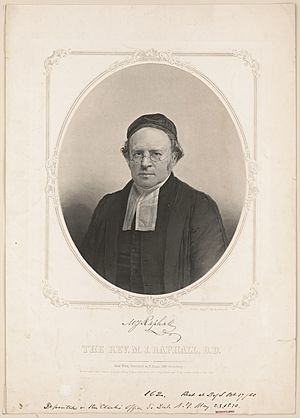Morris Jacob Raphall facts for kids
Morris Jacob Raphall (born October 3, 1798 – died June 23, 1868) was a rabbi and writer. He was born in Stockholm, Sweden. From 1849 until he passed away, he lived in the United States. He is best known for saying, just before the American Civil War, that the Bible and God supported slavery.
Contents
Early Life and Education
Morris Jacob Raphall was born in 1798. His father was a banker for the King of Sweden. When Morris was nine, his father took him to Copenhagen. There, he studied at a Hebrew grammar school. He also received education to become a Jewish minister. This included time in England, starting in 1812. Later, from 1821 to 1824, he studied at the University of Giessen in Germany.
Raphall was very interested in learning languages. To get better at them, he traveled to France, Germany, and Belgium. He earned a Ph.D. degree from the University of Erlangen in Germany. In 1825, he married Rachel Goldston. They had five children together.
Early Career and Writings
In 1834, Raphall gave talks about Hebrew poetry. After that, he started a magazine called Hebrew Review, and Magazine of Rabbinical Literature. This was the first Jewish magazine in England. He had to stop publishing it in 1836 because he became ill.
For a while, he worked as an assistant to Solomon Herschell. Herschell was the chief rabbi of Great Britain. Raphall translated works from important Jewish thinkers. These included Maimonides, Albo, and Herz Wessely. With another rabbi, D. A. de Sola, he translated parts of the Mishnah. He also started translating the Pentateuch, which are the first five books of the Bible. Only the first volume of this translation was published.
In 1840, a false accusation called the blood accusation was made in Damascus. This was a lie claiming Jews used the blood of non-Jews for rituals. Raphall traveled to Syria to help investigate. He wrote a strong response to this false claim in four languages. He also defended Judaism in a debate against a writer in the London Times newspaper. Raphall also wrote a history book about the Jewish people after biblical times. This book covered events up to the year 70 C.E..
Moving to America
In 1841, Morris Jacob Raphall became a minister at the Birmingham Synagogue. He also became the master of its school. He worked there for eight years. Then, in 1849, he moved to New York City.
That same year, he gave a series of talks about biblical poetry. These talks were held at the Brooklyn Institute. He was then chosen to be the rabbi and preacher for the B'nai Jeshurun congregation in Manhattan. This synagogue was also known as the Greene Street Synagogue. He served there until 1866. His duties were reduced then because his health was not good. He passed away in New York on June 23, 1868.
Views on Slavery in America
Before the American Civil War, many Jewish religious leaders in the United States discussed slavery. They often wrote about their views. Generally, rabbis from the Southern states supported slavery. Those from the North usually opposed it. However, there were some exceptions on both sides.
One of the most well-known debates was between Raphall and two other rabbis. These were David Einhorn and Michael Heilprin. Einhorn and Heilprin were more liberal and against slavery. Raphall, however, supported it. Some historians have noted that many Jewish people in New York at that time were also in favor of slavery.
In January 1861, President James Buchanan asked people to pray for the country. This was because the country was close to breaking apart. Many speeches and sermons were given that day. Raphall used this chance to share his thoughts on slavery at his B'nai Jeshurun Synagogue. He spoke about a story from the Bible, Jonah 2:3–4. In this story, the city of Ninevah is saved because its people listened to Jonah's warning. Raphall believed that if both sides of the slavery debate listened to the Bible, the war could be avoided.
Raphall stated that Judaism supported slavery. He said that the practice was morally right according to the Bible. He pointed to several parts of the Bible:
- The Tenth Commandment, which mentions not wanting your neighbor's male or female slave.
- The story of Noah, who cursed his son Ham to slavery.
- The fact that many important figures in the Bible, called Patriarchs, owned slaves.
- Rules in the Bible about returning most runaway slaves to their owners.
- Many rules in the Bible about how slaves should be treated.
Raphall explained that he was speaking as a religious teacher. He said he was not sharing his own feelings. Instead, he was explaining the Bible's view of slavery. He said that in the Bible, a slave is a person with rights. He also said that the way slavery was practiced in the South treated slaves like objects, which he disagreed with.
His speech was published in major newspapers the next day. These included the New York Herald and the New York Evening Express. The New York Times also reported on it. Raphall repeated his talk as a public lecture a week later. Soon after, it was sold as a 20-page booklet called The Bible View of Slavery.
Einhorn and Heilprin were worried that Raphall's views would seem like the official stance of American Judaism. They strongly disagreed with him. They argued that slavery, as it was practiced in the South, was wrong and not supported by Judaism. Einhorn wrote a reply in his German magazine Sinai. This was quickly translated into English. Heilprin also wrote a response in the New York Tribune newspaper.
 | Valerie Thomas |
 | Frederick McKinley Jones |
 | George Edward Alcorn Jr. |
 | Thomas Mensah |


